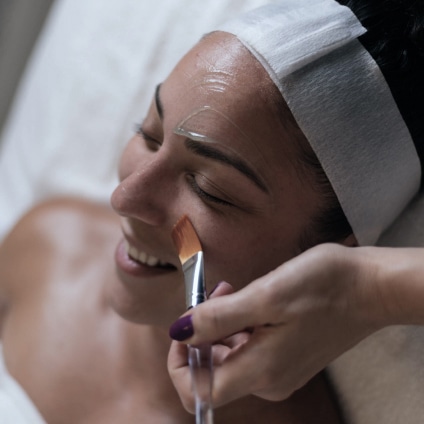Superficial chemical peels have gained popularity in Dubai as an effective way to rejuvenate the skin. However, the safety of this procedure is a common concern for many considering it. This article explores the safety aspects of Superficial Chemical Peels Dubai, offering important tips to ensure a safe and successful experience.
Understanding Superficial Chemical Peels
What Is a Superficial Chemical Peel?
A superficial chemical peel is a non-invasive cosmetic treatment that involves applying a mild acid solution to the skin. The solution exfoliates the outermost layer, removing dead skin cells and promoting the growth of new skin. This treatment is commonly used to address issues like fine lines, acne, uneven skin tone, and sun damage.
Why Choose Superficial Peels?
Superficial chemical peels are favored for their ability to provide noticeable results with minimal downtime. Unlike deeper peels, which may require a longer recovery period, superficial peels allow you to quickly return to your daily activities, making them an attractive option for those with busy schedules.
How Safe Are Superficial Chemical Peels?
General Safety of Superficial Peels
Superficial chemical peels are generally considered safe, especially when performed by a qualified and experienced dermatologist. The mild nature of the acids used in superficial peels, such as glycolic acid, lactic acid, and salicylic acid, means that the risk of serious side effects is low.
Common Side Effects
While superficial peels are safe, they can cause some mild and temporary side effects, including:
- Redness: Your skin may appear slightly red or flushed immediately after the treatment.
- Tingling or Burning Sensation: You might feel a tingling or mild burning sensation during the peel, which usually subsides quickly.
- Dryness and Peeling: As the dead skin cells shed, your skin may become dry and start to peel. This is a normal part of the process.
These side effects are typically mild and resolve within a few days. Following proper aftercare instructions can help minimize these effects.
Rare Risks and Complications
Although rare, there are some risks associated with superficial chemical peels, including:
- Hyperpigmentation: In some cases, the treated area may become darker (post-inflammatory hyperpigmentation), particularly in individuals with darker skin tones.
- Infection: If the skin is not properly cared for after the peel, there is a slight risk of infection. This is why it's essential to follow your dermatologist's aftercare advice.
- Scarring: Although extremely rare, improper application or care could potentially lead to scarring.
These risks are minimized when the peel is performed by a skilled professional and when proper pre- and post-treatment care is followed.
Tips for Ensuring a Safe Superficial Chemical Peel in Dubai
Choose a Reputable Clinic
One of the most important factors in ensuring the safety of your superficial chemical peel is choosing a reputable clinic in Dubai. Look for clinics with experienced dermatologists who specialize in chemical peels. Research their qualifications, read reviews, and ask for recommendations from friends or family who have undergone the procedure.
Have a Thorough Consultation
Before undergoing a superficial chemical peel, have a detailed consultation with your dermatologist. This consultation should include:
- Skin Assessment: The dermatologist will evaluate your skin type, concerns, and medical history to determine if a superficial peel is suitable for you.
- Discussion of Expectations: Clearly discuss your goals and expectations with your dermatologist to ensure you understand what the peel can achieve.
- Understanding Risks: Your dermatologist should explain the potential risks and side effects associated with the peel, as well as how they can be minimized.
Follow Pre-Treatment Guidelines
Proper preparation is key to a safe and effective superficial chemical peel. Your dermatologist may recommend the following pre-treatment guidelines:
- Avoid Sun Exposure: Protect your skin from the sun for at least one week before the peel to reduce the risk of complications.
- Discontinue Certain Products: Stop using retinoids, exfoliants, and other harsh skincare products a few days before the treatment.
- Hydrate Your Skin: Keep your skin well-hydrated in the days leading up to the peel to enhance its resilience.
Adhere to Post-Treatment Care
Following the peel, your skin will be more sensitive and require special care. To ensure a safe recovery and optimal results, follow these post-treatment tips:
- Moisturize Regularly: Use a gentle, non-comedogenic moisturizer to keep your skin hydrated.
- Apply Sunscreen: Protect your skin from UV rays by applying a broad-spectrum sunscreen with a high SPF every day.
- Avoid Scrubbing: Allow your skin to peel naturally and avoid picking or scratching the treated area.
Be Aware of Contraindications
Certain conditions or medications may make superficial chemical peels less safe or effective. For instance, if you have active cold sores, severe rosacea, or are taking specific acne medications like isotretinoin, you may need to avoid chemical peels. Always inform your dermatologist of your medical history and any medications you are currently taking.
Conclusion
Superficial chemical peels are generally safe and effective for rejuvenating the skin, especially when performed by a qualified dermatologist in Dubai. While there are some risks associated with the procedure, they are typically minimal and can be managed with proper care. By choosing a reputable clinic, following pre- and post-treatment guidelines, and understanding the potential risks, you can enjoy the benefits of a superficial chemical peel with confidence.





Comments